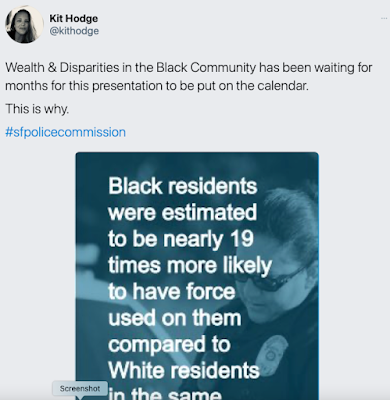San Francisco Police Commission Meeting 2/10/2021 Summary
The San Francisco Police Commission oversees the policy, top leadership and aspects of budget decisions of the San Francisco Police Department. The Board of Supervisors, which appoints some of the commissioners, ultimately controls the budget of the department. I live tweet meetings at #sfpolicecommission, along with a few other dedicated watchdogs. Below is a high-level summary of the most recent meeting. Any factual mistakes are my own.
2/10/2021 Meeting Documents
Asking the Hard Questions
Team work makes the dream work, and that truism was on full display last night as President Cohen deftly led the Police Commission into previously undisturbed, fetid waters at SFPD and beyond. The team asked about strategy and pushed back on Chief Scott where appropriate. It's exciting--to the extent that this work is remotely exciting--to see the Commission questioning the tacit assumptions of policing. The simple action of asking, "but why are you doing that?" cannot be understated in a profession dominated by legacy and a sense of untouchability. Last night was a long meeting, clocking in at about five hours for the public section alone, but it was absolutely worth the sleep deprivation. Keep it up, Commission; I'll stock up on more caffeine.
Center for Policing Equity Bias Report
Wealth and Disparities in the Black Community has been waiting for the Center for Policing Equity report on bias in the SFPD to be released and discussed for months. The CPE report is useful as a guiding system to convert SFPD's own data analysis into per capita analyses by race, though this report uses older data; there will be newer reports coming out at an unspecified date. So, data analysis method in the CPE report = good.
The recommendations in the report, however, were less helpful. As VP Elias pointed out, the Police Commission has already implemented most of CPE's recommended changes, and yet the per capita racial disparities in SFPD policing persist. (So good to hear her talking about a per capita analysis, btw!) To whit, the Commission passed a number of new Department General Orders later in the meeting that reflected those recommendations, including an updated Use of Force policy, a recommended discipline matrix and a policy on Community Policing. There was a strange effort by the Center for Policing Equity to put some of the blame for biased policing on "external" factors. I'm choosing to assume that I am misunderstanding the organization's intent here. Nonetheless, I hope that CPE's future reports offer more detailed and timely recommendations for ending bias.
Speaking of bias audits, the Department of Police Accountability persists in its plans to do yet another bias audit of the SFPD. Which, why? We know what it's going to say. See above. Meanwhile, the DPA and SFPD have yet to take action on its actual mission to root out biased officers from SFPD. There was a long and painful back and forth between Commissioners Elias and Hamasaki and Director Henderson in which the DPA chief bent sideways, forwards and backwards to justify having such a top-heavy agency despite DPA being in such dire need of policy support and follow through. Director Henderson did not want to hear the criticism, and so important policy and discipline follow-through continue to wither on shelves.
Gun Violence in the Bayview
Gun violence has been soaring in 2021 compared to previous years, and the Bayview has been hardest hit. Therefore, it was wonderful to see the Commission ask Chief Scott, why gun violence is soaring, what the SFPD's strategy is and why it isn't working. There was a long discussion of Chief Scott's take, which is informed by a partnership with California Partnership for Safe Communities. Incidentally, that work was paid for by an external grant arranged by Board of Supervisors President Shamann Walton. Was it not important enough for the core SFPD budget?
The Commission pushed back on a number of the Chief's assumptions, and called for violence in the Bayview to be calendared for a deeper discussion soon. It was great to hear all of the Commissioners digging deep into the situation, including whether policing as we know it was the solution. If this Police Commission and Chief Scott can find a better, more effective way forward in the Bayview, it could a) do enormous good and b) have a ripple effect across the whole city in terms of what we really need from SFPD. At least, one hopes. Shoutout to Yulanda Williams of Officers for Justice for her obvious passion for getting policing right in San Francisco, and always excellent public comment. There are people on the force and, most especially, in the community who have answers to all these tough questions. I hope they're given a platform in upcoming discussions.
Bias in Hiring and Promotions
This was a long meeting, so it was encouraging to see the Commissioners continue to dig into the hard questions even in hour five of the meeting. The Department of Human Resources gave a presentation on how it screens for bias in hiring and promotions for SFPD. We all know it's there. The ghost in the machine has specific names. The need for eliminating bias in hiring and promotion was one of the findings in the DOJ SFPD reform report back in 2016. Last night, the SFPD gave a slightly better than usual monthly update on progress on completing the recommendations in that report. I'm not including information on that presentation here because none of it is verifiable until the DOJ releases its own audit of SFPD progress. Also, I don't want to make this a five hour blog post.
---
Before you go, take action! Volunteer for/donate to Wealth and Disparities In The Black Community, founded and led by Phelicia Jones. WDBC has been working on police reform and justice for victims of police violence since the SFPD murdered Mario Woods back in 2015.





















